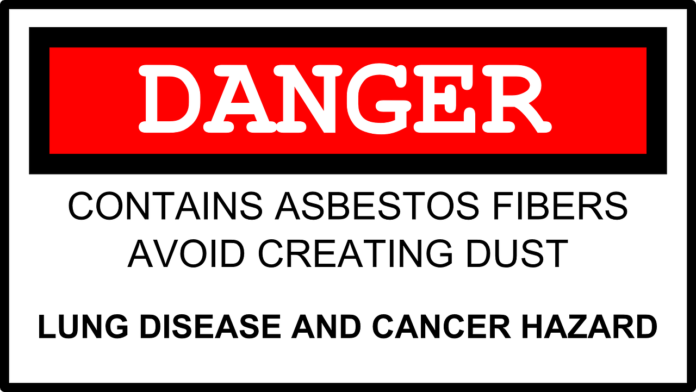May 2024 – A survey has found that one fifth of people (20%) in the UK are unaware of the danger asbestos still poses today, even though it continues to be the biggest cause of work-related deaths in Britain. The survey, from Slater and Gordon Lawyers, heard from more than 2,000 people.
Asbestos was used extensively between the 1930s and 1970s including within the construction of public buildings across the UK, including within schools, hospitals and residential dwellings, despite concerns about the dangers of asbestos first being raised before the start of the 20th century. It would not be until 1999 when all types of the material were finally banned in the UK.
As a result of its widespread use and the fact that asbestos was never removed from all locations following its ban, there remains a real danger of individuals, including children, being exposed to this deadly dust, which exposure can lead to devastating diseases such as mesothelioma, lung cancer, pleural thickening and asbestosis.
Jordan Bell, Head of Industrial Disease at Slater and Gordon, says: “The majority of people who develop an asbestos-related illness were exposed to asbestos during their employment but that is not always the case.
“We have seen an increasing number of people who have developed mesothelioma as a result of what is sometimes termed “second hand” exposure to asbestos. This exposure occurred through contact with asbestos brought into the home on the work clothes of a family member who was exposed to asbestos in their workplace. We have seen cases where the exposure occurred as a result of living nearby to an asbestos factory or where a factory containing asbestos was demolished in an unsafe way, with asbestos dust contaminating the area surrounding the factory.
“We have also seen numerous cases where teachers, lecturers and others who worked in or attended schools with an asbestos problem have gone on to develop an asbestos-related disease having been present when asbestos was disturbed where they were working.
We know that asbestos diseases can and do result from even very low exposures, so it is a real concern to see the data from our survey including that one in five people aren’t aware of the dangers they could be facing every day by just going to work.”
A further 12% in the survey said they were unaware of any health implications that could be caused by asbestos and 7% thought it couldn’t cause any issues health whatsoever. Some of those who answered are public servants working in public buildings where the danger of asbestos has been known and publicised for many years, including education, healthcare, and utilities, as well as the widely known areas such as construction and shipbuilding.
One of the most serious health dangers that asbestos can cause is mesothelioma – a diagnosis of which only 26% of those surveyed were aware. Mesothelioma is a form of cancer which most frequently occurs in the lining of the lungs, but which can also occur in the lining of the abdomen, known as the peritoneum.
Mesothelioma, like all asbestos-related illnesses, is caused by inhaling asbestos dust and fibre, causing damage to the body’s cells. It is thought over time that this damage results in changes which can eventually result in cancerous cells. The average time for mesothelioma to develop after exposure to asbestos dust is around 40 years, but mesothelioma can develop as soon as within 5-10 years of the exposure.
There are approximately 2,500 people a year in the UK who are diagnosed with mesothelioma. The most common first symptoms of mesothelioma include breathlessness, a persistent cough, chest pain, tiredness, loss of appetite, and weight loss.
“Individuals or families facing a mesothelioma diagnosis should contact a specialist asbestos lawyer without delay. It may seem impossible to put forward a claim for something that could have happened 30 or 40 years ago but at Slater and Gordon we have been supporting families affected by asbestos-related diseases for decades and will use all of our extensive expertise to quickly identify how the condition has developed and the steps that can be taken to secure compensation.”
Help keep news FREE for our readers
Supporting your local community newspaper/online news outlet is crucial now more than ever. If you believe in independent journalism, then consider making a valuable contribution by making a one-time or monthly donation. We operate in rural areas where providing unbiased news can be challenging. Read More About Supporting The West Wales Chronicle























